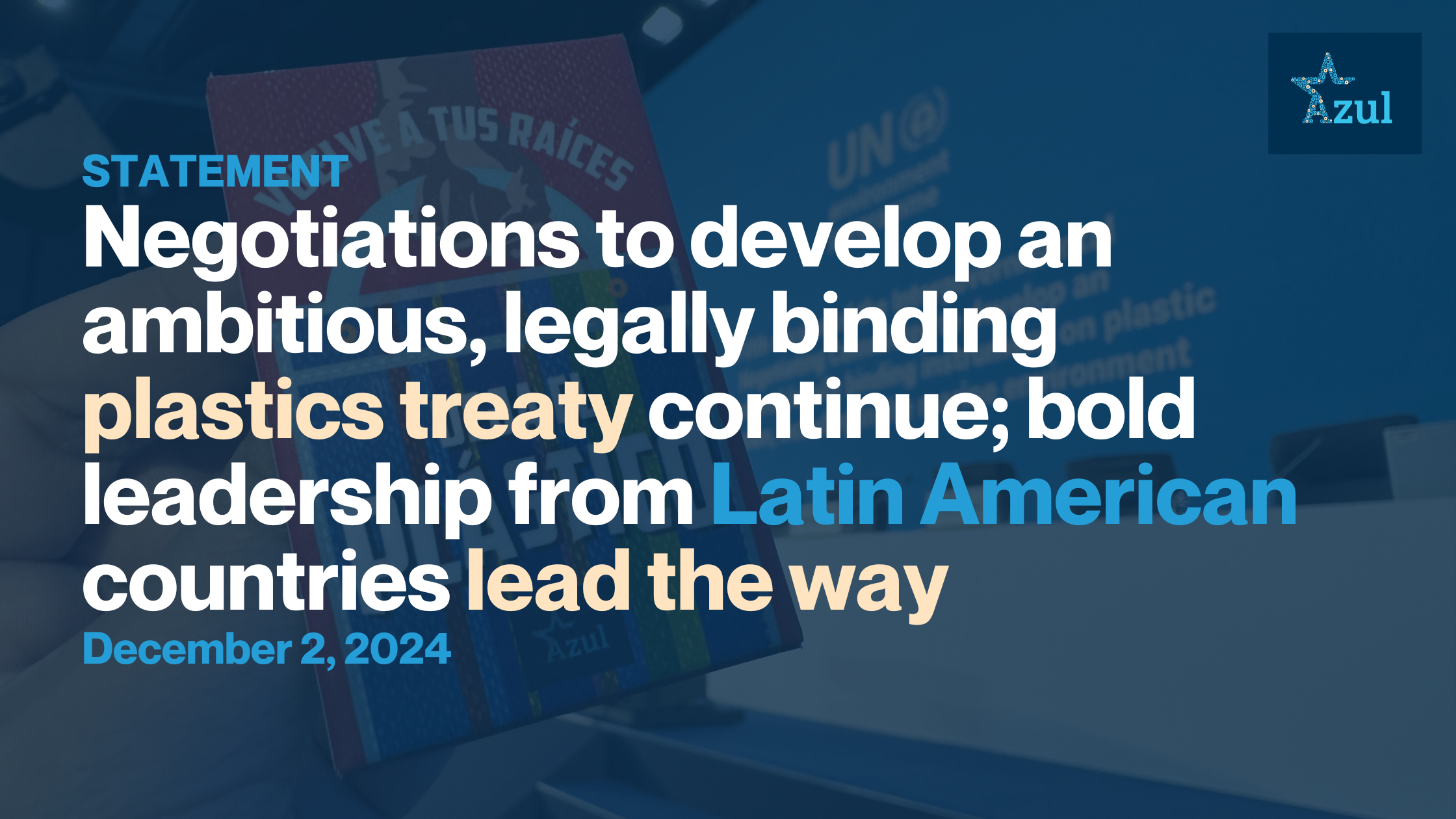Negotiations to develop an ambitious, legally binding plastics treaty continue; bold leadership from Latin American countries lead the way

For Immediate Release
Monday, December 2, 2024
Contact (Español/English):
media@azul.org
Negotiations to develop an ambitious, legally binding plastics treaty continue; bold leadership from Latin American countries lead the way
Busan, South Korea (December 2, 2024) – After 7 days of negotiations in Busan and a total of 5 rounds of negotiations over 2 years, the fifth session of the Intergovernmental Negotiating Committee to develop an international legally binding instrument on plastic pollution, including in the marine environment (INC-5), concluded its work without delivering a final text of the plastics treaty and instead announced the work would continue during a resumed series at INC 5.2.
Although more than 100 member states supported Panama’s proposal to adopt a global target to reduce plastic production, the entire draft text of the treaty is still on the table for discussion, marking minimal progress since the start of the INC. While the draft text contains important elements – like production reduction – there are a number of crucial elements still under debate, including financing mechanisms. Instead of seeing substantive progress, we witnessed a small minority of petrochemical states continually employ delay strategies to stall negotiations and block an ambitious treaty that would address the entire lifecycle of plastics.
Following the conclusion of negotiations at INC-5 and the announcement that the INC will continue its work during a resumed session, INC 5.2, Marce Gutiérrez-Graudiņš, Azul’s Founder and Executive Director, released the following statement:
“The 2021 UNEP-Azul report, Neglected: Environmental Justice Impacts of Marine Litter and Plastic Pollution, found that plastic pollution disproportionately and negatively affects marginalized communities around the world during every stage of the plastic lifecycle – from extraction to waste – and hinders the achievement of all 17 United Nations’ Sustainable Development Goals.
While we are disappointed to have finished this week’s work without a final text for the treaty, we are heartened to see the leadership of member states in Latin America championing an ambitious treaty with concrete solutions that center human rights. We are encouraged by the dedication to continue the work at INC 5.2 – the health of our communities, future generations, and the planet is at stake; it is crucial that we get it right.”
In addition to presenting a proposal to set a global target to reduce plastic production – a proposal backed by a majority of member states – Panama’s delegation took center stage during plenary sessions to make strong and necessary calls for decisive action, setting the stage for increased ambition.
Further illustrating that a significant number of member states support ambitious action, Mexico’s delegation took the floor during closing plenary to read a list of 94 member states who are calling on the treaty text to include a legally binding obligation to phase out the most harmful plastic products and chemicals of concern in plastic, emphasizing that without such mandatory obligations, the treaty will fail to deliver on its promise.
In another display of support for an ambitious treaty, Rwanda’s delegation took the floor to share a statement on behalf of 85 nations from around the world who are calling for a legally binding treaty that mandates reduction targets, phases out harmful chemicals, supports a just transition, and includes an equitable and mandatory financing mechanism.
During INC-5, Azul published a number of resources, including proposed language on equitable and mandatory financing mechanisms, ongoing analysis on the Chair’s Non-Paper 4, and factsheets on U.S. Latino voters’ attitudes towards plastic pollution from the 2024 National Azul Poll, among other materials. The full list of INC-5 resources is available for download in English and Spanish at Azul.org.
# # #
Azul is an ocean justice organization working with grassroots Latino communities to protect coasts and the ocean. Founded in 2011, Azul has developed –and executed– campaigns that achieved groundbreaking ocean conservation policy victories.